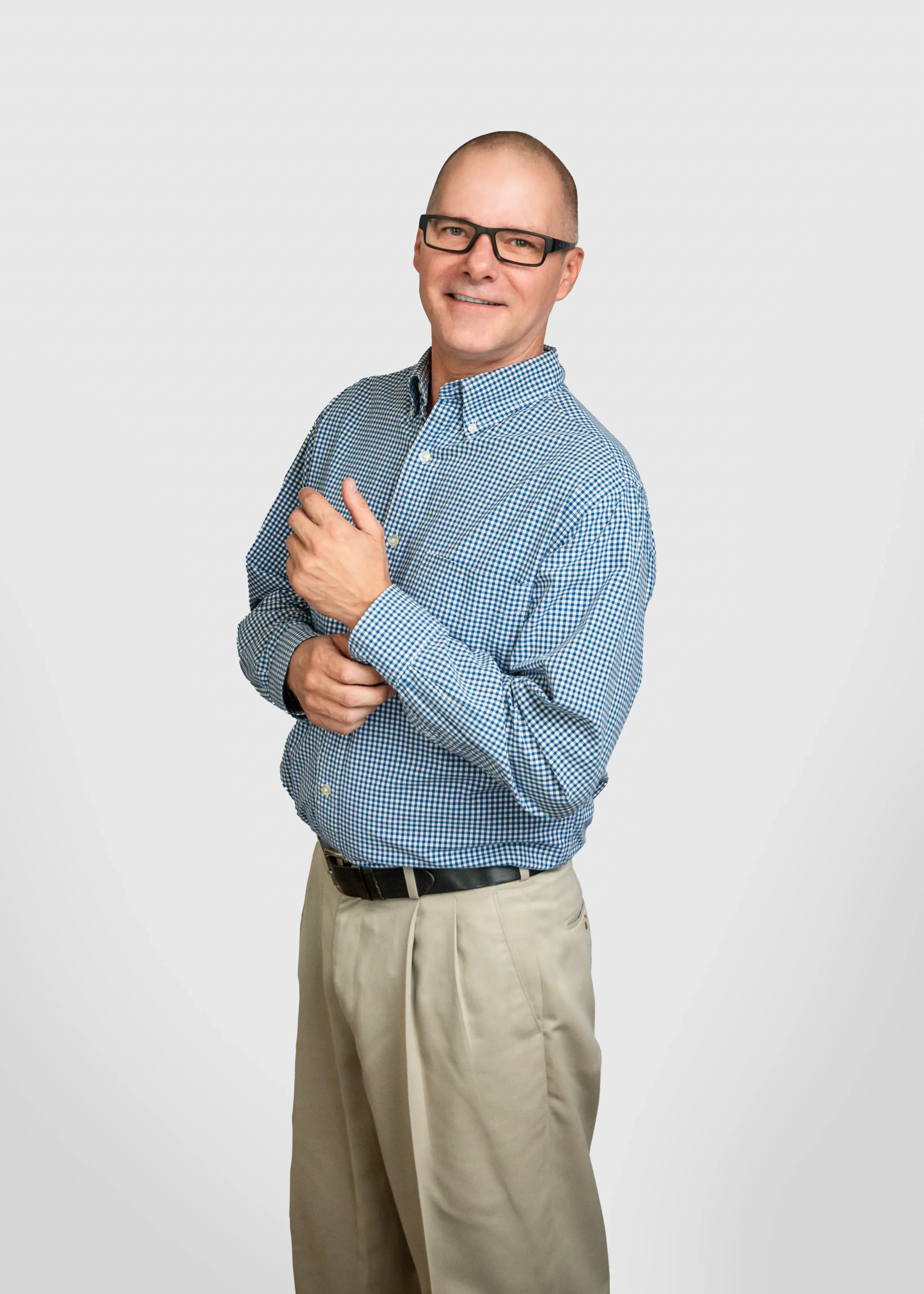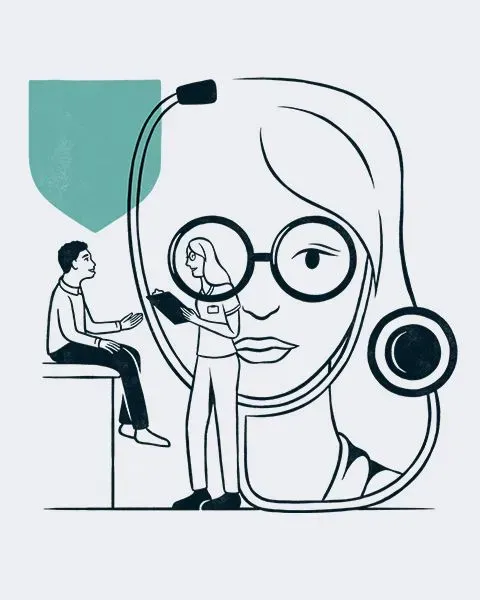
Set Yourself Apart in a Successful Physician Site Visit
Learn the do’s and don’ts of how to make the most out of this multi-day, in-person job interview.
August 25, 2022
Nothing will give you a clearer picture of what a new job will actually be like than the site visit.
But for physicians and advanced practice clinicians, the excitement of meeting the team and touring the city is often accompanied by nerves and questions. What will happen on this multi-day job interview? How can you put your best foot forward?
PS&D Senior Physician Recruiter DJ Barker has been helping candidates prepare for the interview and site visit process for decades, in collaboration with PS&D’s recruitment resource coordinators.
He says knowing what to expect and preparing for your site visit are the best things you can do to approach the experience with confidence and ease.
“Site visits are incredibly valuable,” DJ says. “It’s face-to-face time, where a practice gets to learn more about who you are and determine whether you’re a good fit. But I often tell candidates, remember that you’re not the only one being interviewed. You’re interviewing the health system or clinic, and in a way, you’re interviewing the location. And there’s definitely things you can do to get the most out of your time there.”
(Of course, the first step in this process is to get the interview. Our recruitment team can help you with that.)
As for what comes next, DJ shares his advice on how to approach the site visit and offers do’s and don’ts on how to navigate each part of the trip.
Planning and Scheduling the Site Visit
Where you’re interviewing will determine whether in-house staff will assist you.
With smaller practices, you may be expected to arrange your own travel and accommodations. Larger health systems typically will connect you with a coordinator who will plan your visit.
If you’re working with a coordinator, keep these tips in mind:
Propose several dates and times.
Offer multiple sets of available dates and plan to potentially stay 3 to 5 days.
Be realistic about your accommodations.
Request flight and lodging plans that align with the health system’s budget (don’t expect to stay at the Hilton if you’re interviewing with a non-profit health system).
Share a professional email address for communications.
Provide an email you check regularly in case there are changes to your travel or housing.
What to Expect During Your Physician Site Visit
Once your trip is planned, it’s time to prepare for the actual visit. Site visits serve several purposes, and in between interviews, socializing and touring the town, your time will be largely accounted for.
Participate in Multiple Interviews and Tours:
Panel interviews.
This could be a more formal interview with 2 to 3 people, or it could be a more casual lunch discussion with up to 10 providers in a large conference room.
Interviews that are smaller, or more one-on-one.
These typically occur back-to-back over 4 to 6 hours, with breaks scheduled in between.
On-location tour of facility or clinic.
You will meet the staff and get to see the working environment and resources in action. DJ says to make sure your tour guides are showing you both inpatient and outpatient facilities.
“This is your chance to ask questions like, ‘Is there access to an onsite pharmacy? Where’s Behavioral Health located? If I need to call in a dietician, what does that look like?’” he says.
“All the resources you use in daily life as a provider, you’re going to want to see those things as you’re going through a guided tour.”
Socialize With Potential Employer:
A fun, active outing is common.
For example, during one site visit, DJ says, a physician candidate was invited to attend a holiday lights celebration at the zoo with the medical director and his family. Another candidate applying for a job in Alaska was invited to a deep-sea fishing excursion.
A casual dinner party could include spouses or partners.
Practices usually plan an after-interview or after-hours relaxed dinner, where you can socialize with the people who would be your immediate colleagues, leadership, and their spouses or partners.
DJ says this is a great time to ask non-work-related questions such as:
- What area of town do you live in and why?
- Where do your kids go to school?
- What do you do for rest and relaxation around here?
Plan on Extracurriculars:
Explore where you'll potentially live.
You can request to set aside time to explore the local housing market.
“Do a little work on the front end to maximize your experience,” DJ says. “Talk with a real estate agent prior to getting on the plane. They’ll do the work for you on house hunting and have everything set up.”
Visit the places that interest you most.
From local schools and places of worship to cultural sites and tourist attractions.
Act like a local.
Attend a concert or eat at a recommended restaurant that serves your favorite cuisine. “If you have time, I highly recommend doing as many extras as you can,” DJ says. “This is potentially your new hometown, and it’s important that you really get a feel for the community.”

DJ Barker, Senior Physician Recruiter, PS&D
The Do’s and Don’ts of a Successful Site Visit
It’s good to remember that every interaction will feed into whether you receive an offer. To set yourself up for success, DJ offers some do’s and don’ts.
Site Visit Do’s:
Do stay positive.
Have a positive outlook with every interview answer. Instead of mentioning downsides of your current practice, focus on your desire for a new challenge or adventure.
Do research the organization.
Review the practice’s mission statement and values. Learn their unique qualities, such as donating services to underserved communities. Weave this knowledge into your interview answers.
Do be on time.
You’re in a new locale. Allow plenty of time to navigate traffic and any delays you might encounter.
Do treat everyone with respect.
From the person arranging your travel to the person at the clinic’s front desk to the person holding the elevator door for you, be friendly and courteous in all interactions.
Do let your personality shine through.
No one wants to work with a robot who answers every question with what they think the employer wants to hear. Let the team see some of the qualities that make you unique, with humor and authenticity.
Do ask questions.
Prepare 4 or 5 questions for each group. “This is your chance to interview them too,” DJ says. “If something’s on your mind, ask them."
For example, you could ask:
- If someone gets sick, are you using Locums to back them up?
- How long has the Medical Director been here?
- How close do physicians live to the hospital?
- What’s your relationship with the universities here?
- Do residents come in?
Do bring copies of your CV.
Don’t expect a printer to be available in your hotel or at the practice. Bring copies of your CV with you.
Do dress the part.
Wear clothing appropriate for each situation throughout your site visit. Ask who will be present during your interviews. Understanding their roles will help you know how to present yourself. “Business attire is appropriate,” DJ says. “Don’t show up in jeans and a T-shirt, even if you’re going fishing with the medical director after the interview. If you’re unsure, err on the side of overdressing.”
Do express enthusiasm.
If the site visit has confirmed — or increased — your interest in the job, let the practice leaders know. It will remove any ambiguity about whether you’ll accept a possible job offer. “If you want the job, say so, and end on that note,” DJ says. “They’re probably interviewing more than one candidate. Don’t leave them questioning whether you’re interested.”
Do follow-up.
Send a thank you note. It may seem antiquated, but it shows your appreciation of their time and your interest. Send a brief thank you email first and follow it with a handwritten thank you card.
Site Visit Don’ts:
Don’t accept a site visit if you’re not that interested in the job.
Site visits are a considerable expense and investment for employers. Make sure this is a position you have a high likelihood of accepting before you agree to a site visit.
Don’t wing it.
Preparation is key. Research and know the employer, the role, the players and what questions you want answered.
Don’t speak negatively about any former employer or colleague.
Healthcare is a small world, and people move around. Never put down any employer or person.
Don’t leave your cell phone volume on.
Silence your phone during all interviews and outings.
Don’t travel the night before or the day of.
Flight delays are common, and you don’t want to leave your arrival time to chance. Give yourself a buffer day. Arrive the day prior and leave the day after to minimize fatigue and maximize interview performance.
Don’t talk too much about compensation.
Focusing too much on salary could give the appearance that money is a larger priority to you than finding a good fit with a practice. Save the compensation conversation for the contract negotiation phase.
Don’t overlook the details.
Remember, you’re interviewing the practice, too. Pay attention to what they’ve planned for your site visit. Think about whether the agenda fits your interests and ask for changes to the schedule if you need to.
Don’t bypass the chance to talk with locals.
Your work will only be one part of your life in a new location. Take the opportunity to talk with someone at a coffee shop or park about what they like — and don’t like — in the community.
Don’t leave your family out.
If possible, involve your family in the process. Include your partner or spouse in social activities and the community tour. Just be mindful of the fact that only you and your partner’s expenses will be paid for.
Don’t overschedule yourself.
Downtime to recharge mentally and physically will be important so you have the stamina to be “on” and at your best for all interviews, tours and outings. If you’re squeezing in too much each day, you may appear frazzled and stressed rather than relaxed and polished.
One last thing: Remember to have fun on your site visit as much as possible! It’s meant to be an enjoyable experience that allows for the human side of the job interview to take center stage. Allow yourself to soak it in and enjoy it.
How PS&D Can Help
Working with a physician recruiter like DJ can ease much of your anxiety around site visits. Think of us as a liaison between you and your potential new employer. We’ll help you navigate initial virtual interviews and facilitate thorough planning to ensure you have the most productive, positive site visit possible.
We’re ready to help you with the interview and site visit process from beginning to end. Reach out today to get started.


